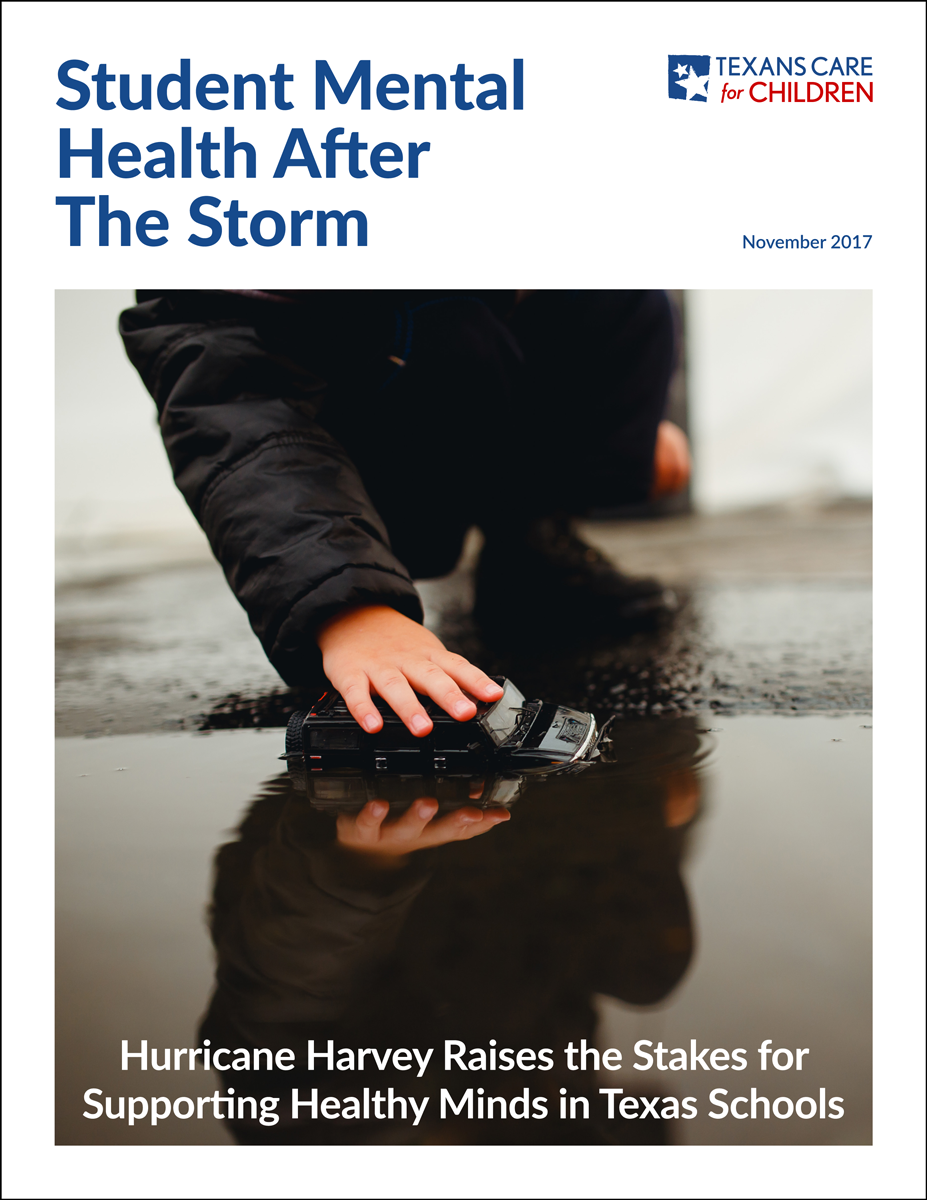Report updated: December 5, 2017
For Immediate Release
Contact: Peter Clark, pclark@txchildren.org, 512-473-2274
New State Task Force Signals State Leaders’ Recognition of the Challenge But Is No Substitute for Action by the Legislature and TEA
Austin – As state legislators hold a hearing in Houston today regarding Hurricane Harvey’s impact on schools and the state’s response, a new report urges Texas leaders to address student mental health in communities affected by the storm as well as the rest of the state.
The report by Texans Care for Children, “Student Mental Health After The Storm: Hurricane Harvey Raises the Stakes for Supporting Healthy Minds in Texas Schools,” explains that the trauma caused by the hurricane and its aftermath can affect students’ academic performance, behavior in school, and overall well-being for years to come. The risk is particularly high for students who do not have a strong support system around them or who have experienced other forms of childhood trauma that affect children’s brains, learning, and behavior, such as such as the loss of a loved one, instability at home, witnessing violence, neglect, or physical, emotional, or sexual abuse.
“Kids who have been through trauma — whether it’s a hurricane or the loss of a loved one or something else — need extra support to ensure they are successful in the classroom and in life,” said Josette Saxton, Director of Mental Health Policy at Texans Care for Children. “Of course, Texas also needs to address student mental health challenges beyond trauma and the communities hit by Hurricane Harvey.”
Beyond trauma, mental disorders are common among school-age children. In any given year, up to one in five children experience a mental disorder, including attention-deficit/hyperactivity disorder (ADHD), anxiety disorder, depression, conduct problems, and other disorders. A shocking 10 percent of Texas high school students report that they attempted suicide during the previous year, according to the 2013 Texas Youth Risk Behavior Surveillance Survey.
The release of the report comes one day after the horrific shooting in Sutherland Springs, which will lead to policy conversations on multiple subjects, including the mental health of the shooter, the survivors, and community members. Texans Care for Children is hopeful that this report can play a small role in informing those conversations.
The Texans Care for Children report found that individual school districts and community organizations have started to work on student mental health in recent years, but they have done so with little support from the state. Districts have implemented campus-wide programs to improve school climate, offered school-based mental health services, and partnered with mental health treatment providers in their communities, although the extent of these efforts is unknown because the state does not collect data on them.
“Not only do schools have a lot to gain when they support their students’ mental health, but they are also well-positioned to address mental health because they’re such a big part of kids’ lives,” said Ms. Saxton. “In fact, national research shows that kids are just as likely to receive mental health services on campus as they are in the community.”
The report notes that the state’s role in supporting student mental health has largely consisted of providing a website with recommended best practices, requiring a minimal amount of training for school personnel, providing limited grant funds for those seeking more training, and taking a few other limited steps.
The report notes that state lawmakers showed greater interest in addressing student mental health during the 2017 legislative session, putting in statute for the first time a recognition of the importance of trauma-informed practices in schools and developing a multi-faceted student mental health bill, HB 11, that fell just short of reaching a vote on the floor of the Texas House of Representatives. The Speaker of the Texas House has also issued interim charges directing the House Public Health Committee to study student mental health, including the role of the Texas Education Agency (TEA), before the 2019 legislative session.
The report says the new state Hurricane Harvey Task Force on School Mental Health Supports is further evidence that state leaders are increasingly ready to address student mental health. The report states that the Task Force can play an important role in identifying resources, sharing information with school districts, and shining a light on student mental health. However, the Task Force does not have dedicated funding nor the statutory authority necessary to take many of the steps needed to address this challenge. The vast majority of the state’s work on this issue will require action by the Legislature, Governor, and TEA.
“We were glad to see the creation of the new state Task Force,” said Ms. Saxton. “It gets the ball rolling and shows that state leaders recognize the need to address student mental health, but it’s no substitute for the work that TEA and the Legislature need to do.”
The report includes a number of recommendations for the Governor, the Legislature, TEA, and school districts and campuses. Among the recommendations for the Legislature, the report urges legislators to:
- Direct TEA and the Health and Human Services Commission (HHSC) to develop a state plan to assess districts’ needs, provide training and technical assistance to districts, and provide mental health services to students in need;
- Provide funding to districts to hire or contract with mental health professionals; and
- Require mental health to be included in health education curriculum across all grade levels in a developmentally appropriate manner.
###





